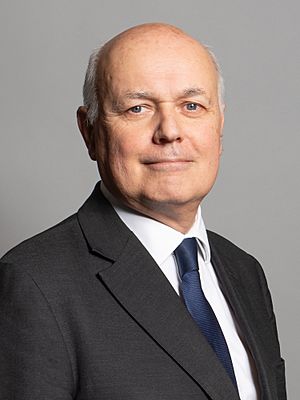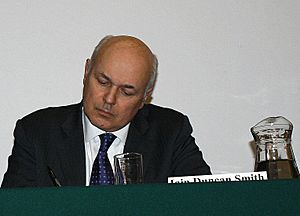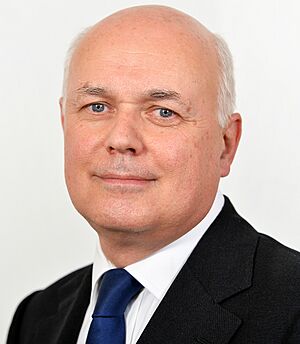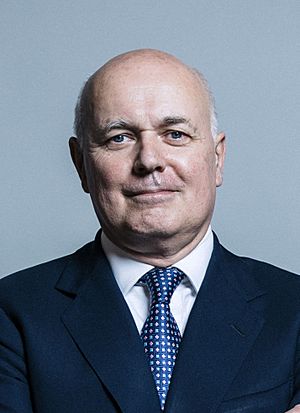Iain Duncan Smith facts for kids
Quick facts for kids
Sir Iain Duncan Smith
|
|
|---|---|

Official portrait, 2020
|
|
| Secretary of State for Work and Pensions | |
| In office 12 May 2010 – 18 March 2016 |
|
| Prime Minister | David Cameron |
| Preceded by | Yvette Cooper |
| Succeeded by | Stephen Crabb |
| Leader of the Opposition | |
| In office 13 September 2001 – 6 November 2003 |
|
| Monarch | Elizabeth II |
| Prime Minister | Tony Blair |
| Preceded by | William Hague |
| Succeeded by | Michael Howard |
| Leader of the Conservative Party | |
| In office 13 September 2001 – 6 November 2003 |
|
| Preceded by | William Hague |
| Succeeded by | Michael Howard |
| Chair of the Social Justice Policy Group | |
| Assumed office 12 September 2016 |
|
| Preceded by | Rory Brooks |
| In office 7 December 2005 – 12 May 2010 |
|
| Preceded by | Office established |
| Succeeded by | Mark Florman |
| Member of Parliament for Chingford and Woodford Green Chingford (1992–1997) |
|
| Assumed office 9 April 1992 |
|
| Preceded by | Norman Tebbit |
| Majority | 4,758 (10.8%) |
| Shadow cabinet portfolios | |
| 1997–1999 | Shadow Secretary of State for Social Security |
| 1999–2001 | Shadow Secretary of State for Defence |
| Personal details | |
| Born |
George Ian Duncan Smith
9 April 1954 Edinburgh, Scotland |
| Political party | Conservative |
| Spouse |
Betsy Fremantle
(m. 1982) |
| Children | 4 |
| Residences | Swanbourne, Buckinghamshire, England |
| Alma mater | Royal Military Academy Sandhurst |
| Nickname | IDS |
| Military service | |
| Branch/service | British Army |
| Years of service | 1975–1981 |
| Rank | Lieutenant |
| Unit | Scots Guards |
| Battles/wars | The Troubles |
Sir George Iain Duncan Smith, often called IDS, is a British politician. He was born on 9 April 1954. He served as the Leader of the Conservative Party and Leader of the Opposition from 2001 to 2003.
Later, he was the Secretary of State for Work and Pensions from 2010 to 2016. He has been a Member of Parliament (MP) for Chingford and Woodford Green since 1992.
Contents
Early Life and Military Service
Iain Duncan Smith was born in Edinburgh, Scotland. His father, Wilfrid George Gerald "W. G. G." Duncan Smith, was a decorated Royal Air Force pilot during the Second World War. His mother, Pamela Summers, was a ballerina.
He attended a training school called HMS Conway and later the Royal Military Academy Sandhurst. From 1975 to 1981, he served in the Scots Guards, a part of the British Army. During his time in the military, he served in Northern Ireland and Southern Rhodesia (now Zimbabwe).
After his military service, Duncan Smith worked for a company called GEC Marconi in the 1980s.
Start of His Political Career
Duncan Smith joined the Conservative Party in 1981. He first tried to become an MP in 1987 but was not elected.
In the 1992 general election, he was elected as the MP for Chingford. This was a safe seat for the Conservative Party. He was known for his Eurosceptic views, meaning he was cautious about the European Union.
From 1997 to 1998, he served as the Shadow Secretary of State for Social Security. This role involved looking at social welfare policies for the opposition party. From 1998 to 2001, he was the Shadow Secretary of State for Defence.
Leader of the Conservative Party

After the 2001 general election, William Hague resigned as Conservative leader. In September 2001, Iain Duncan Smith won the leadership election. He became the new leader, partly because Margaret Thatcher supported his views on Europe.
In the local elections of 2002 and 2003, the Conservative Party gained many seats on local councils. At the 2002 Conservative Party conference, Duncan Smith famously said, "do not underestimate the determination of a quiet man."
However, some Conservative MPs began to doubt his ability to win the next general election. In October 2003, there were questions raised about payments made to his wife for her work. This situation led to a vote of confidence in his leadership.
Vote of Confidence
On 29 October 2003, a vote of confidence was held among Conservative MPs. Duncan Smith lost this vote. He resigned as leader eight days later, on 6 November 2003. Michael Howard became his successor. Duncan Smith was the first Conservative leader since Neville Chamberlain not to lead his party into a general election.
After Leadership: Backbench and Social Justice
After stepping down as leader, Duncan Smith returned to being a regular MP, known as a "backbencher." In 2004, he started the Centre for Social Justice. This is a research group that works with small charities to find new ways to tackle poverty.
In December 2005, he became the Chairman of the Social Justice Policy Group. This group published important reports like Breakdown Britain and Breakthrough Britain. These reports looked at problems like unemployment, family breakdown, and educational failure. They also suggested many policy ideas to help improve society.
He was re-elected as MP for Chingford and Woodford Green in the 2005 general election.
Secretary of State for Work and Pensions
After the 2010 general election, David Cameron became Prime Minister. He appointed Iain Duncan Smith as the Secretary of State for Work and Pensions. In this role, he was in charge of the Department for Work and Pensions (DWP).
During his time as Secretary, he oversaw major changes to the welfare state. This included introducing Universal Credit, a new system to simplify benefits and tax credits into one payment. He also introduced a new Work Programme to help unemployed people find jobs.
In March 2016, Duncan Smith resigned from the Cabinet. He stated that he disagreed with the government's plans to cut disability benefits. He felt these cuts were unfair to vulnerable people.
Later Career as an MP
In the 2016 EU membership referendum, Duncan Smith supported leaving the European Union. He worked with the Vote Leave campaign.
In the 2019 Conservative Party leadership election, he supported Boris Johnson. Johnson won the election and became Prime Minister. In 2020, Duncan Smith was made a Knight Bachelor for his political and public service.
In June 2020, he helped launch the Inter-Parliamentary Alliance on China. This group aims to get democratic countries to work together on challenges related to China.
In March 2021, the Chinese government announced sanctions against Duncan Smith and other MPs. They were banned from entering China, Hong Kong, and Macau. This was because China said they spread "lies and disinformation" about the country.
In October 2021, Duncan Smith was involved in an incident outside a Conservative Party Conference in Manchester. A court later ruled that some people involved were not guilty of certain charges, stating that expressing political views was reasonable.
In July 2022, Duncan Smith supported Liz Truss in the Conservative Party leadership election. He believed she would deliver the benefits of Brexit. He encouraged his colleagues to unite behind her.
In September 2022, he joined other senior Conservatives in asking for the Chinese government's invitation to the Queen's funeral to be withdrawn. He also supported Rishi Sunak in the October 2022 Conservative Party leadership election.
At the 2024 general election, Duncan Smith was re-elected as an MP.
Political Views
Views on Family and Marriage
Iain Duncan Smith has been very involved in issues related to family and social breakdown. He believes in early actions to prevent families from breaking apart.
In 2010, he looked at a program in Norway that helped couples think carefully before getting a divorce. He wanted to explore similar ideas in Britain to reduce the long-term costs of family breakdown.
In 2011, he said it was important to talk about the benefits of marriage for stable families. He believed that stable families often lead to better outcomes for children. In April 2012, he supported same-sex marriage, saying it would promote stability in relationships.
Views on Immigration
Duncan Smith believes that strict immigration controls are important. In 2011, he said that only immigrants with "something to offer" should be allowed into the UK. He felt that sometimes foreign workers took jobs that British school leavers could do.
He believes that Britain needs an immigration system that gives unemployed British citizens a "level playing field" in the job market.
Views on Brexit
In December 2019, Duncan Smith voted in favor of the Brexit withdrawal agreement. He argued that MPs had already spent a lot of time debating the agreement.
Personal Life
Iain Duncan Smith married Elizabeth "Betsy" Fremantle in 1982. They have four children. They live in Swanbourne, Buckinghamshire. He is a Roman Catholic.
See also
 In Spanish: Iain Duncan Smith para niños
In Spanish: Iain Duncan Smith para niños
 | Ernest Everett Just |
 | Mary Jackson |
 | Emmett Chappelle |
 | Marie Maynard Daly |




